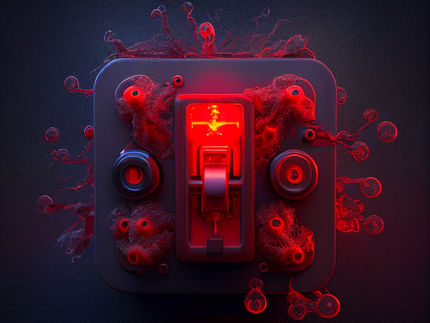Immune cell-test on the International Space Station
The human body is fine-tuned to Earth’s gravity. A team headed by Professor Oliver Ullrich from the University of Zurich’s Institute of Anatomy is now conducting an experiment on the International Space Station (ISS) to study whether this also applies to human cells. On the evening of April 18, the transporter spaceship Dragon lifted off from the Cape Canaveral launch center in Florida with a cargo of UZH immune cells on board.
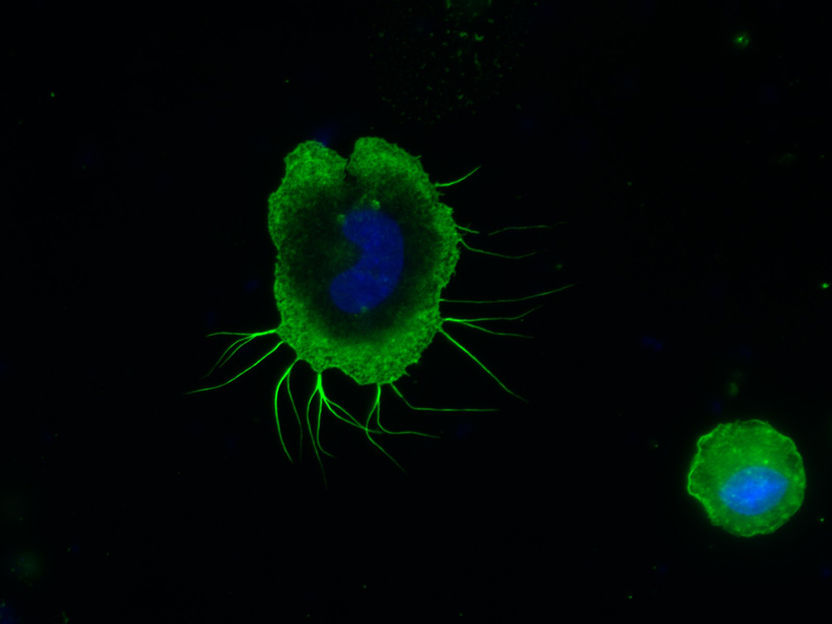
Phagocyte known as macrophage with the cell architecture and cell nucleus (blue)
Svantje Tauber, Anatomisches Institut
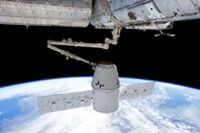
The Dragon capsule transporting the experiment of the University of Zurich to the ISS.
NASA
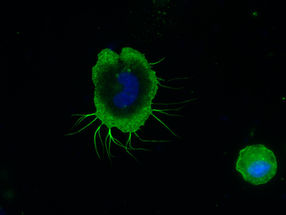
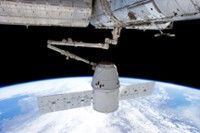
We know the effect of gravity on muscles, bones and joints inside out; it has been studied extensively in medicine for centuries. For a long time, however, exactly how gravity affects the cells remained a mystery. Thanks to modern cell biology and space technology, we can now study precisely whether and how cells are also adapted to life on Earth. In zero gravity, for instance, various immune system functions are impaired: Phagocytes known as macrophages, which kill and destroy invading bacteria, are no longer capable of protecting the person optimally from infections, which is why astronauts often suffer them. Professor Oliver Ullrich from the University of Zurich’s Institute of Anatomy now wants to investigate how the structure and metabolism of these phagocytes change during a three-day stint in zero gravity. Samples with immune cells are currently on their way up to the International Space Station (ISS) on the so-called Cellbox Mission, where they will be studied in an experiment. The Dragon capsule carrying the fixed samples is due to splash down in the Pacific Ocean on May 18.
Three days in zero gravity
The ISS experiment focuses on the long-term impact of zero gravity on human phagocytes – especially their cytoskeleton and molecules, which are important for cell communication. On parabolic flights with zero gravity for 22 seconds and in tests on research rockets with five minutes of zero gravity, Professor Ullrich’s team already discovered that cells from the human immune system already respond to the absence of gravity within seconds. Key molecular functions for cell-to-cell communication and cell migration are immediately impaired.
Based on a three-day experiment, the researchers are now looking to investigate whether the vast number of changes that take place in seconds or minutes of zero gravity are actually processes of adaptation to a new environment or far-reaching, permanent problems. “Conducting research on the ISS is as if – after studying many trees one by one – you climb a mountain to see the whole forest,” explains Ullrich. This ISS experiment is necessary to gain an overview of the processes in the cells.
Getting to the bottom of life on Earth
“Conducting research in space enables us to understand life on Earth better,” explains the professor from the University of Zurich. Only from these results can the team deduce which conditions are crucial for the development of complex life and whether Earth is the ideal place for the necessary cellular processes. If nothing else, the Cellbox experiment should reveal the properties of the cell architecture that depend on Earth’s gravitational force – and whether gravity might be a key prerequisite for the existence of multicellular organisms.
The basic research conducted in the ISS lab also has a direct practical benefit: “The experiment provides key data that enables us to gauge the risk on future spaceflights more effectively,” says Ullrich.
